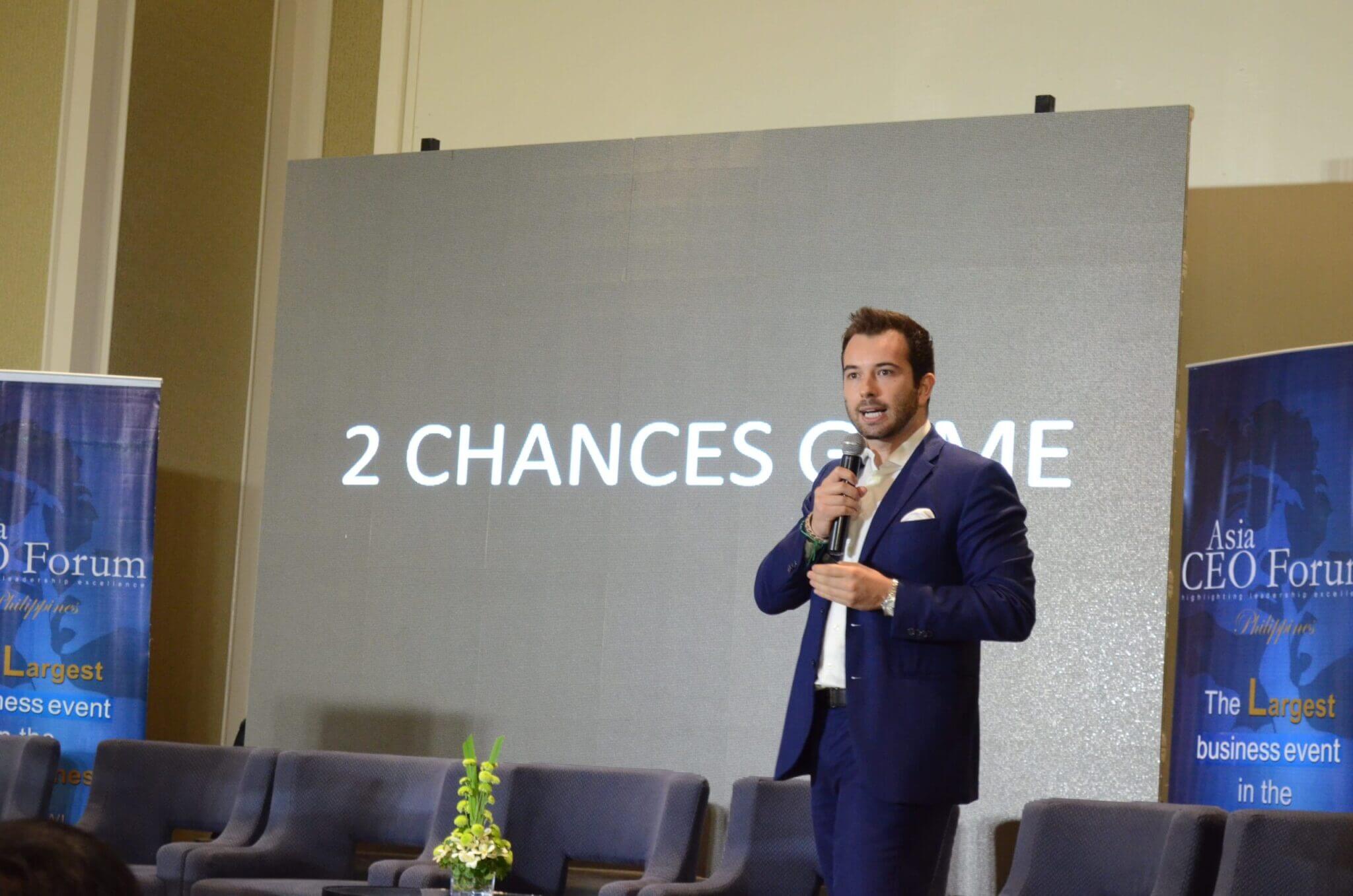Mario Berta is the founder and CEO of FlySpaces.com, a tech-start up that empowers SMEs to get access to flexible office and retail space. Mario is a professional Speaker with more than 5 years of experience in helping Corporation with their digital transformations.
Previously, Mario served as a Senior Consultant to PLDT Global and had a stint as Nova Founder’s director for growth, a tech incubator and VC firm that boasts among its investor Richard Li (among HK’s richest tycoon) and Asia Regional Co-Founder of Rocket Internet’s Easy Taxi, which saw immense growth under his leadership. His wealth of experience is also topped up by the fact that, he was also a contestant in “The Apprentice”.
A true global professional with extensive experience in leadership, strategy, innovation and expansion, Mario is passionate about empowering and enabling people, developing businesses, and supporting companies and institutions all around the World. The FlySpaces.com is a venture embedded with Mario’s drive, values and beliefs and he shares with us his story today.
In your own words what is FlySpaces?
We self brand ourselves as the “Airbnb” for office space, we are a market place for short-term commercial rentals.
How did you come up with the idea of FlySpaces?
I had to go through the immense pain of finding an office myself multiple times in my previous ventures, and dealing with Landlords.
Could you walk us through the process of starting up FlySpaces?
We started in the Philippines, which is also our operational HQ, well Philippines does not score high in “easy place to do business” but again thanks to my previous experience it was relatively easy. Then we set up operations in Singapore, which is our Holding and where we have a small office. Most our team is in Manila and it was my team in my previous times in Rocket Internet and Nova Founders.
Did you encounter any particular difficulties during startup?
Difficulties in building a start-up (of any industry) are ordinary administration! Mostly now as we are new concept we need to educate the market on adoption, if we had to build a “simple” e-commerce company it will be easier, as people are buying items on-line all the time. We are telling businesses to find office space in a different way they are currently searching and using the office space differently. So most is education.
How have you been developing FlySpaces since startup?
We experienced tremendous growth and traction challenge now is to keep up with growth. As many companies we might pivot a little our business model in the future, but is more on the space acquisition side hence not a radical pivot.
Wish I could disclose more on the company direction but I can’t at this stage.
What kind of feedback did you get for FlySpaces so far?
People love it ! We save so much time and money for SMEs (which are our primary customers), should be a no brainer for an SMEs to make a fix cost like office space variable, so they scale it up or down based on their business.
But some customer still think we actually own a co-working spaces that’s why we do not put our address on our business cards !
Do you face a lot of competition in this industry?
There is not ASEAN platform like ours as of now, our competitors are the local players (so a localize platform in MY, another one in Sing etc..). The big American guys are focusing in the US, Canada and Australia. We wanted the first moving advantage that in a market place is critical for success.
In a way we compete with our own merchants to find the leads before them. But we can provide an seamless solutions for SMEs to find office space without having them going merchant by merchants, and our price by mandatory-policy are the same as customer will be going to merchants directly.
What can you tell us about the industry?
The best example is having the World’s 3rd most valued start up operating in this space (WeWork), investors they are also betting that companies will change the way they occupy their office space, and WeWork, which is a “full chain” player, is a great example. The continuous growth of players like Regus (which is our partner) and co-working spaces in this part of the world is the sign that this trend is hitting the SEA region.
What is the future of the industry?
I believe companies will look at office space as more commoditized thing, we will still need developer to build amazing and sustainable buildings but what it will change will be how spaces will be occupied hence monetized. Big Corporations will always take conventional big offices, but the SMEs that always made about 90% of the companies and employ 70% of the work force in any economy will look at office space differently.
As tech and asset free players, we can easily adapt to changes, not event WeWork could be as agile as we could be. Even with if everything goes according the plan (which never does) for WeWork takes at least 18 months to find a space, do the JV, lawyers’ negotiations, start construction, launch the space. We acquire spaces over 1 skype phone call.
Were there anything that disappointed you initially?
Of course! Asia is still not a first mover market, when we talk to big developers instead of looking at us as en opportunity to learn and diversifying their risk, they look at us as potentials treat and this is sooooo common in this part of the world. But I am convinced that once a trend hits Asia it moves 10x faster then other places in the World, due to their tech savvy and young populations. A great example is Capital Land, doing a JV to build their first co-working space. The trend has started!
What do you think about being an entrepreneur in Asia?
Thanks for this question! I am a great fan of Asia, I think there is not OTHER PLACE in the World better than Asia to be and to be an entrepreneur. When I took some “sabbatical” time after my times in Rocket Internet I travelled to Latin America (only part of the world I did not know) and yes is a great place all over from Mexico to Colombia and Brazil, but still light years away from the vibrancy of the Asians’ megalopolis. Buenos Aires, San Paolo, Bogota are not even close to Manila, Jakarta or Hong Kong in terms on what is happening at every level.
Nonetheless Asia still face some challenges mostly related to finding talents, but the hard working mentality of the Asian’s people is nearly-impossible to find it in other part of the World.
I am native Italian but I have spent a considerable amount of time in Spain and other EU countries and I always tell my University mates and child-hood friends that their only problem is not having problems at all. Europeans are accustomed to very accommodating policies by their governments (some one more than others).
What is your opinion on Asian entrepreneurship vs Western entrepreneurship?
Back on to my point of the question above is talent related.
I think there are 2 main issues that are still road-blocking the boom of an entrepreneurship spirits in this part of the world.
- Is Socio-Economic:-
Most of the middle class in the SEA’s region has just in this decade (a side from SG and HK of course) reached the comfort zone, meaning only recently they can finally afford a car and finally afford a home, it will take time for these middle classes to evolve and be willing to leave this comfort zone. The economies are doing so well that any good-educated person can get a very decent job from the big conglomerates which control basically most of the sectors the SEA’s economy, Philippines top 40 families represents 88% of the country’s GDP for instance. Even us we compete with the big telecom to hire ops managers and marketing managers, we offer a great working environment but much less money than a telecom, instead they can offedr a telecom working environment but more money, more benefits, more stability, less work loads, etc.
- Cultural:-
The very essence of Entrepreneurship is based on taking big risk, thinking dramatically out of the box, being a hassle, not taking no for an answer, being perseverant, not respecting rankings or procedures. Now, these are threads that I do not see in this part of the world yet, a part from rare cases.
As mentioned before SEA’s economies are dominated by the Tycoons, these guys where the only ones following the “non-rules” if you look at their past you can see these common threads.
Every single conglomerate in this part of the world is trying to build a sort of “innovation center” in within its organization and they are all dramatically failing cause there are recycling their own people to do that. I.e. If you want to build a innovation center of a bank you need to hire NON banking people and so on.
China I think is the exception there is a tremendous entrepreneurship drive, but I am not an expert on China.
What is your definition of success?
I think you can tangibly defined success but you have to use your own metric, in my case is very simple is money, but money is a result of a lot things that you did very well. I would like to see Flyspaces becoming a 1 Billion dollar company because of the prestige that comes with it and the market recognition of changing how the world use office space. I do not really need 1 billion in my bank account as long as the company does well and the employees are “infected with our culture”
Why did you decide to become an entrepreneur?
It was Rocket Internet’s fault! (Better to say merit). Rocket is the best school of entrepreneurs in the world. I enjoyed every single day I worked there. They allow me to build a company as I was it was mine (at least at the beginning), they finance it and they also pay me to do so. Thanks to rocket I shifted from a corporate person to an entrepreneur, I will never be grateful enough to them for that. And at some point like many former rocket we decide to build our own ventures, that bing jump of the cliff not that big anymore.
In your opinion, what are the keys to entrepreneurial success?
I believe most of them are the ones I mentioned above, but one: being great recruiter, nowhere in the world like in Asia you need a strong team, if you are an A player you hire an A+ player and so on, hire people that are better than you than can complete you.
Any parting words of wisdom for entrepreneurs out there from your personal experience?
Let’s Do It!
Connect
https://web.facebook.com/mario.stark.16






























